

Lee Crockett sur Twitter : "15 Best Sites for Open Source Images #creativecommons #digcit #digitalcitizenship. 15 Best Sites for Open Source Images. Recently, a teacher we know put together a concise and effective PowerPoint presentation which was well received.
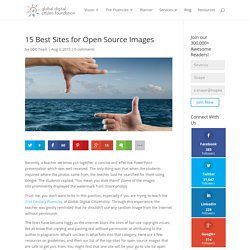
The only thing was that when the students inquired where the photos came from, the teacher said he searched for them using Google. The students replied, “You mean you stole them!” (Some of the images still prominently displayed the watermark from iStock photo!) Trust me, you don’t want to be in this position, especially if you are trying to teach the 21st Century Fluencies of Global Digital Citizenship. Through this experience, the teacher was gently reminded that he shouldn’t use any random image from the Internet without permission. The lines have become foggy as the Internet blurs the lines of fair use copyright issues. K12Blueprint sur Twitter : "Analogue and #Digital Classrooms - Layouts for Learning 2- Mixed Media-Small Group #design. Analogue_and_Digital_Classroom.pdf. Snapchat tells teens: Keep your clothes on!
Ahh, Valentine's Day: the day of romance, filled as it is with roses, chocolate, and college kids sneaking into football stadiums to have sex and chronicle it on Snapchat.
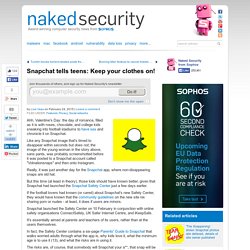
Like any Snapchat image that's timed to disappear within seconds but does not, the image of the young woman in the story above, sans pants, was probably screenshotted before it was posted to a Snapchat account called "Volnationsnaps" and then onto Instagram. Really, it was just another day for the Snapchat app, where non-disappearing snaps are old hat. But this time (at least in theory), those kids should have known better, given that Snapchat had launched the Snapchat Safety Center just a few days earlier. If the football lovers had known (or cared) about Snapchat's new Safety Center, they would have known that the community guidelines on the new site nix sharing porn or nudes - at least, it does if users are minors.
It's essentially aimed at parents and teachers of its users, rather than at the users themselves. A new twist on cyberbullying. Over the years, I’ve worked hard to teach my students at Darlington School, a K-12 day and boarding school in Rome, Georgia, about appropriate online behavior.
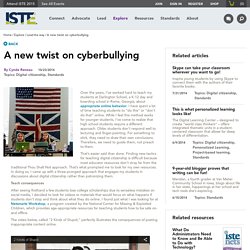
I have spent a lot of time teaching students to “do this” or “don’t do that” online. While I feel this method works for younger students, I’ve come to realize that high school students require a different approach. Protecting Your Online Reputation: 4 Things You Need to Know [INFOGRA… Edutopia sur Twitter : "Our favorite resources for #DigitalCitizenshipWeek: #digcit...
Chris sullivan sur Twitter : "Q6 This provides done useful #digitalcitizenship touch points #aussieED @robmctaggart... 4 Characteristics Of Critical Digital Pedagogy. 4 Characteristics Of Critical Digital Pedagogy by TeachThought Staff “Pedagogy is not just a delivery device for the digital humanities.
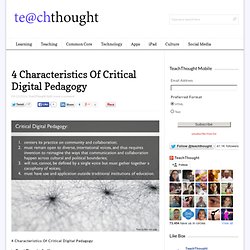
It should be at the core of what the digital humanities is as an academic discipline.” Jesse Stommel is an Assistant Professor of Digital Humanities at University of Wisconsin-Madison, and this idea has a lot to it. In this idea, Stommel shifts the practice of pedagogy as a vehicle for “teaching” to something more whole–considering the humanities not as a school of thought or academic genre, but rather a reason for being. Stommel offers four characteristics of critical digital pedagogy. 1. 2. 3. 4. The presentation is mostly macro thinking of what education can be, quoting from Freire, Dewey, and even Emily Dickinson to make the case for what’s possible in a modern–digital and connected–learning environment.
How to Thrive as a Digital Citizen. Thanks to the pervasiveness of easy-to-use technology and the accessibility of the internet, teachers are no longer lecturing from a dais as the purveyor of knowledge.
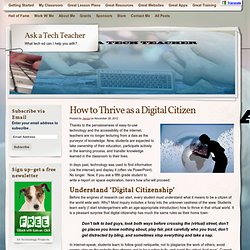
Now, students are expected to take ownership of their education, participate actively in the learning process, and transfer knowledge learned in the classroom to their lives. In days past, technology was used to find information (via the internet) and display it (often via PowerPoint). No longer. Now, if you ask a fifth grade student to write a report on space exploration, here’s how s/he will proceed: Understand ‘Digital Citizenship’ Before the engines of research can start, every student must understand what it means to be a citizen of the world wide web.
Educate yourself: Cybersmart. Test your knowledge about what children are doing in their digital world.
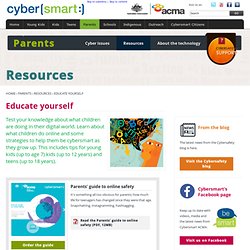
Learn about what children do online and some strategies to help them be cybersmart as they grow up. This includes tips for young kids (up to age 7) kids (up to 12 years) and teens (up to 18 years). Parents' guide to online safety It's something all too obvious for parents; how much life for teenagers has changed since they were that age. Snapchatting, Instagramming, hashtagging. Multimedia resources. Madeinargentina : Tomando Apuntes en el Siglo ... MrsAdamsTCETech : Great videos. Wrapping up ...
Schools Can No Longer Ignore the Importance of Digital Citizenship. 12-Feb-2014 Schools can no longer ignore the importance of digital citizenship.
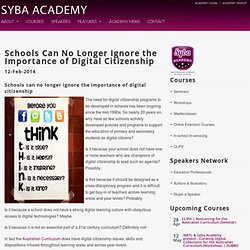
Digital Learning Day: Resource Roundup. Why have passwords taken over our lives? Last updated 10:45 21/10/2013 I'm on my 25th work password.
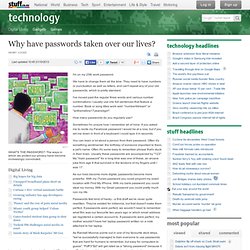
We have to change them all the time. They need to have numbers or punctuation as well as letters, and can't repeat any of your old passwords, which is pretty standard. I've moved past the regular three words and various number combinations I usually use into full sentences that feature a number. Some very good advice for all... - ICentre Mt Alvernia. Website shut down after cheating claims. A website alleged to have helped tertiary students to cheat on assignments has been shut down and police are now investigating.
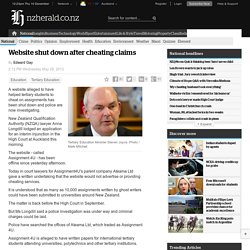
New Zealand Qualification Authority (NZQA) lawyer Anna Longdill lodged an application for an interim injunction in the High Court at Auckland this morning. The website - called Assignment 4U - has been offline since yesterday afternoon. Today in court lawyers for Assignment4U's parent company Ateama Ltd gave a written undertaking that the website would not advertise or providing cheating services.
It is understood that as many as 10,000 assignments written by ghost writers could have been submitted to universities around New Zealand. The matter is back before the High Court in September. But Ms Longdill said a police investigation was under way and criminal charges could be laid. Police have searched the offices of Ateama Ltd, which traded as Assignment 4U. Student Safety in the Age of Facebook. 29 Steps to Internet Safety for Kids. Digital Footprint. Plagiarists, beware: the internet will find you out.
Managing your digital footprint - Digital Citizenship Adventures. Goal and overview Goal: The overall goal for this adventure is to help you understand how you project yourself to world on the Internet.
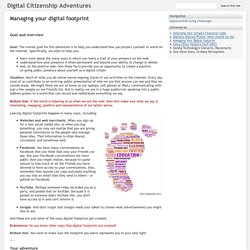
Specifically, we want to help you:learn more about the many ways in which you leave a trail of your presence on the webunderstand how your presence is often permanent and beyond your ability to change or deleteand, on the positive side, how these facts provide you an opportunity to create a positive, on-going public presence about yourself as a digital citizen Situation: Much of what you do online leaves ongoing traces of our activities on the Internet.
Every day most of us contribute to an evolving public presentation of who we are that anyone can see and that we cannot erase. Digital Footprint. Online Safety Tips and Tools to Protect Kids and Inform Parents about Internet dangers. Our Space: Being a Responsible Citizen of the Digital World. As Digital Tools Abound, Help Kids Self-Regulate. Teaching Strategies By Yalda T. Uhls With tablets, laptops, apps, and online games, there’s great promise in technology to inspire and excite students to learn with digital tools.